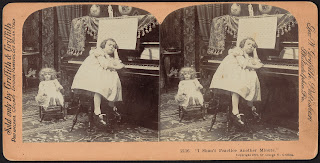 This is my original text:
This is my original text: Since it's the current storm across the internet is Why Chinese Mothers are Superior, including thousands of comments right on the Wall St. Journal site itself, I thought I'd join in.
When I first finished reading the entire article, my first thought was:
I wonder what is the difference in suicide rates between children raised this way and the Western way?Better journalists than I have already found this, from CNN: Push to achieve tied to suicide in Asian-American women. The tremendously sarcastic part of me says 'well, at least they got As instead of A-minuses...' But, more seriously, this is not a hearty endorsement of Ms. Chua's assertion that "Chinese parents raise such stereotypically successful kids." I don't think disproportionately high suicide rates equal 'success.'
I do bristle at this:
What Chinese parents understand is that nothing is fun until you're good at it. To get good at anything you have to work, and children on their own never want to work, which is why it is crucial to override their preferences.Wow... is that ever not my experience. I've watched babies who can't stand for more than a second or two giggling in joy at the fun of falling over, wobbling, trying again and again and again.
I've watched 8 year-olds slog through pages and pages of words they couldn't read, trying to break the code, so they could play the computer game that requires their reading skills to be far beyond their 'grade level.'
I've watched 12 year-olds play the same battle on a video game, over and over and over again, talking together and trying different strategies until they win.
I've watched a 14 year-old sew and pick out the same seam ten, twelve, fifteen times in order to create the look she wanted, convinced it was possible and that she could do it.
Ms. Chua has clearly not spent any time reading the biographies of the preternaturally talented: Wayne Gretzky on the ice until after dark day after day; David Beckham's endless corner kick practice; Stephen King's 1000s of words of writing every day since he was a teenager...
... examples abound throughout every single field of human endeavour. That is, specifically, intentional ongoing boring and reward-free practice and entirely voluntary work on a chosen activity.
And, while we're there: how 'fun' is anything once it's mastered? Does anyone giggle the whole time they're walking, for the sheer joy of it, more than 3 months after they've really figured it out?
The fun in life is in becoming good at things, in the discovery that we can do more than we thought, certainly not in simply performing things we already know we're great at. Sure, it's fun from time to time to impress others, but that's a thin joy. It's extending ourselves to ever-new heights, overcoming new challenges, surpassing our last achievements, or trying completely new things-- even failing totally at them.
There is so much more...
- What is so magical about piano and violin? Why not guitar and sax? Why not drums and harp?
- Why musical performance and not acting or sports? No... really --what is better about classical music compared to classical theatre? How is music better than physical activity? Why not one instrument and one sport? Is it only because there is no way to get an A as a hockey player?
- Have we determined that 'success' in life doesn't include being happy?
- Did all the research about 'good grades don't make life success' disappear?
I found the description of the protracted piano practice disturbing, but the justification using the child's behaviour later than night is a real problem for me.
The story reminded me a little of the creepy stories of children who have been terrified by something, whose parents think they're 'fine' because the child is sitting still, not crying or making a fuss.
Those children are experiencing the natural response to tremendous stress: fear paralysis. Children aren't strong enough to fight and running away triggers a curious predator's instinct to pounce, so their best chance of survival is to hide, stay still and silent and hope to be mistaken for a tree. Their silence is not an indication that they're 'fine', it is an indication that they've been traumatized.
The story reminded me a little of the creepy stories of children who have been terrified by something, whose parents think they're 'fine' because the child is sitting still, not crying or making a fuss.
Those children are experiencing the natural response to tremendous stress: fear paralysis. Children aren't strong enough to fight and running away triggers a curious predator's instinct to pounce, so their best chance of survival is to hide, stay still and silent and hope to be mistaken for a tree. Their silence is not an indication that they're 'fine', it is an indication that they've been traumatized.
When a child who has been unable to connect with her mother's approval and affection for hours and hours and hours, because of some inability to meet some demand or expectation, is finally able to appease her, the relief she feels will take over her whole body.
She'll giggle, snuggle, and cling to mother in the hopes of never, ever again experiencing the deep sense of discord between needing her mother's affection and love, and what she has to perform to get it.
 Repeat this too often, and the attachment will cease to be elastic enough to withstand the tension. The child will disconnect... from something. Mom. Life. Herself.
Repeat this too often, and the attachment will cease to be elastic enough to withstand the tension. The child will disconnect... from something. Mom. Life. Herself.
She'll giggle, snuggle, and cling to mother in the hopes of never, ever again experiencing the deep sense of discord between needing her mother's affection and love, and what she has to perform to get it.
 Repeat this too often, and the attachment will cease to be elastic enough to withstand the tension. The child will disconnect... from something. Mom. Life. Herself.
Repeat this too often, and the attachment will cease to be elastic enough to withstand the tension. The child will disconnect... from something. Mom. Life. Herself.
Who cares? As long as she gets an A...








Bravo.
ReplyDeleteThis is crazy. A song comes to mind... "Little Boxes" by Marvina Reynolds.
ReplyDeletehttp://www.youtube.com/watch?v=2_2lGkEU4Xs
Because who cares about individuality when it's easier to control people who are all the same? And who cares about other art forms or sports? Because they're beneath our children in the first place. Actually, who cares about the kids at all?
Ugh.
Terrific rebuttal, Linda!
ReplyDeleteWell said Linda!
ReplyDeleteAs you know, I can relate to piano practice, but here's the thing. I got to practice more than I wanted to when I had to rehearse particular music for a recital but I was always grateful when, at that recital, I could play as well as I wanted to because the repetition had overridden my nervousness. Beyond that, I played the piano lots and lots - well beyond my "required" time to practice - because I loved playing the piano.
ReplyDeleteMy brother, on the other hand, got frog-marched to the piano to practice (and to study for school exams, whereas I just did it on my own and got better grades), because he wanted to learn how to play guitar and the piano was required "first". As a result, he took three years of lessons under duress and walked away from the piano, and consequently, from the guitar.
What I can see from that is that making a child practice doesn't make that child any better in the long run. The skills that are grudgingly acquired during that enforced practice don't "stick" and you have a miserable kid in the meantime. It just doesn't make sense. Let kids do stuff because they are interested and then let them do it until they aren't interested anymore. Then it's fun, then they really learn and then it sticks.
Can you relate to Amy Chua ? Would YOU throw a homemade card by your child back in her face because it was made by them with love to you ? Thats what this woman did . Would YOU , in sybil style , make her practice at the piano without letting her even go to the bathroom ? Read this book before you make any opinions about her . This woman is EVIL and I dont even know how something like this could be published . I want my money back I think we should ALL take the book back to the store and DEMAND OUR MONEY BACK.
ReplyDelete... apparently the sarcasm isn't dense enough for this one...
Delete